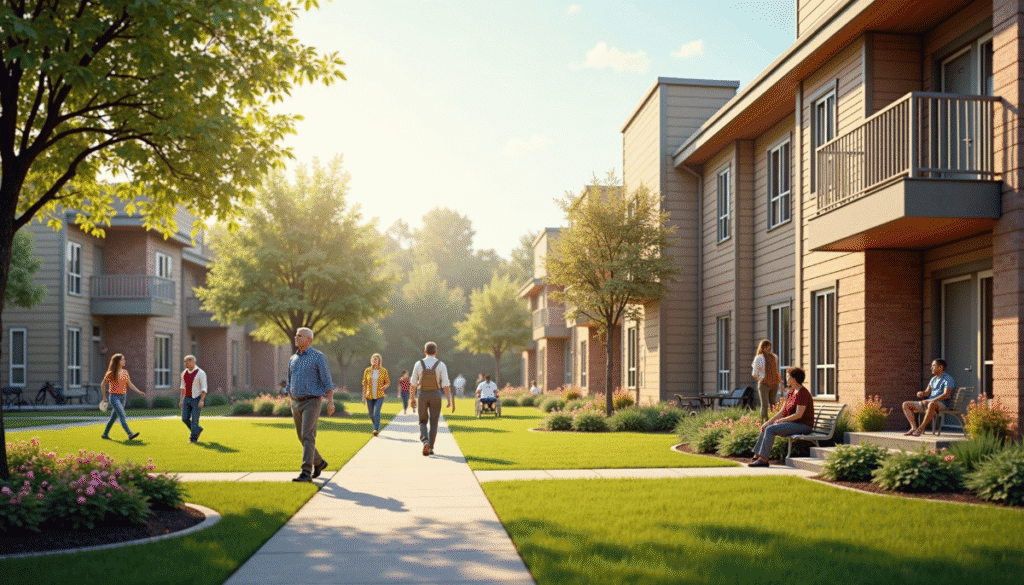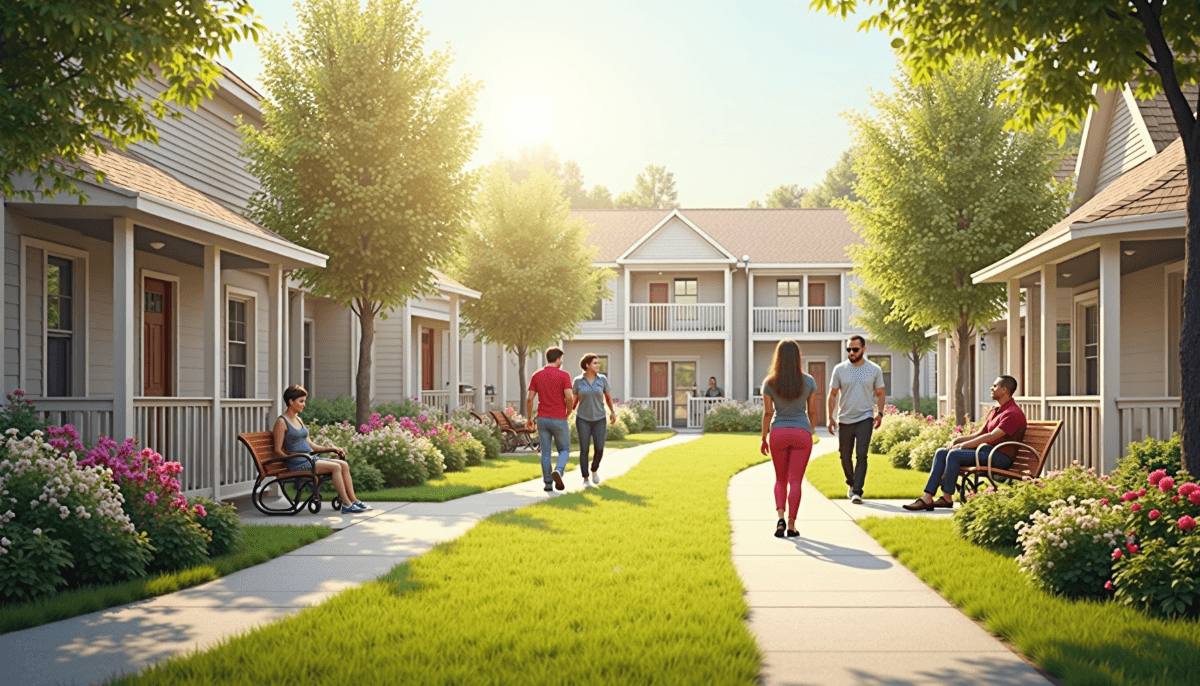Housing programs like Section 8 (housing) offer life-changing opportunities for veterans seeking stability. The United States Department of Housing and Urban Development (HUD) oversees these schemes, which provide rental assistance to eligible low-income groups, including veterans.
Among such initiatives, the HUD-Veterans Affairs Supportive Housing (HUD-VASH) program goes further by integrating rental housing vouchers with case management and supportive services to address specific issues like mental health and homelessness.
Key Benefits of Section 8 Housing for Veterans
- Lower housing costs: Tenant-based vouchers make rental homes affordable for low-income veterans.
- Family-focused support: Case management services address the unique needs of veteran families, ensuring housing stability. Through collaborative programs, such efforts ensure that homeless veterans and their families can access permanent housing, transforming their long-term futures.
HUD-VASH Assistance Explained
HUD-VASH provides a unique solution for veterans experiencing homelessness. Combining HUD housing choice vouchers with services from the Department of Veterans Affairs (VA), this collaborative program addresses both financial and personal barriers. Eligible veterans receive comprehensive support to maintain housing while accessing essential resources.
Highlights of the HUD-VASH Program
Veterans who are homeless can achieve stability through the HUD-VASH program, which offers both housing and essential supportive services.
Homeless veterans benefit from:
- Housing choice vouchers: These cover a large portion of rental costs for eligible veterans.
- Case management: Services like mental health care and job placement address personal challenges.
- Long-term sustainability: By meeting HUD-VASH operating requirements, participants secure lasting housing options.
Eligibility Requirements for HUD-VASH
- Verification of status as a veteran.
- Income level within Section 8 Housing Choice Voucher guidelines.
- Proof of homelessness or risk of becoming homeless. HUD-VASH vouchers are allocated through public housing authorities in collaboration with VA medical centers. This ensures low-income veterans receive the help they need to secure affordable housing.
The HUD-VASH program not only offers rental assistance programs but empowers United States veterans to rebuild their lives with dignity and security.
How Housing Vouchers Help Veterans
HUD-VASH vouchers serve as a bridge to stability for homeless veterans, offering access to affordable housing coupled with tailored support services. The HUD-Veterans Affairs Supportive Housing program represents a collaborative effort between the Department of Housing and Urban Development and the Department of Veterans Affairs, where low-income veterans receive a Section 8 housing choice voucher paired with comprehensive case management.
This initiative is designed to support veterans experiencing homelessness, focusing on those with disabilities, mental health needs, or chronic conditions.
By providing housing assistance and connecting veterans to vital community resources, the HUD-VASH program promotes long-term stability and self-sufficiency.
Importantly, the program prioritizes veterans in dire circumstances, ensuring personalized services for veterans who are homeless, including housing search assistance and consistent case management through local public housing agencies.
Main Features of HUD-VASH
- Rental assistance through tenant-based vouchers, enabling veterans to find suitable housing in their communities.
- Case management and supportive services, including mental health care, addiction recovery, and access to VA medical facilities.
- Partnerships with public housing authorities to streamline the application process for low-income veterans.
- Eligibility determined by the Veterans Health Administration, ensuring services focus on veterans most in need. Through its strategic integration of rental assistance and health services, the HUD-VASH program provides permanent housing solutions that are adaptable to the needs of veterans with disabilities. Veterans participating in HUD-VASH benefit from sustained engagement with VA case managers, helping them navigate challenges while maintaining housing stability.
Supportive Housing Options For Veterans
Supportive housing initiatives address more than just the need for shelter, offering homeless veterans in the United States access to programs that enhance their quality of life. These solutions, available through partnerships with the United States Department of Housing and Urban Development and nonprofit organizations, cater to diverse needs like employment readiness and healthcare. For veterans housing programs, flexibility remains central to ensuring successful outcomes for participants.
Types of Supportive Housing Programs
- Transitional housing: Provides temporary residency combined with structured resources such as job training, addiction recovery, and mental health services.
- Permanent supportive housing: Tailored for those requiring ongoing care, this option integrates rental assistance programs with case management to address chronic conditions.
- The Housing First model: Prioritizes immediate access to affordable housing without preconditions, enabling veterans to stabilize before addressing other challenges. Programs such as HUD-VASH emphasize collaboration between public housing agencies, VA facilities, and community-based outreach clinics to ensure seamless access to resources. Beyond traditional housing assistance, these initiatives aim to reduce homelessness among veterans by promoting dignity, stability, and independence. The adaptability of programs like the Section 8 housing choice voucher program ensures that eligible low-income veterans receive the support necessary to maintain their housing in the community.
Designed to provide more than shelter, supportive housing programs empower veterans with disabilities and other vulnerable groups to access permanent housing solutions alongside case management and supportive services. This approach reflects a collaborative effort from organizations such as the Department of Veterans Affairs, offering tailored strategies for improving housing opportunities for veterans and their families.
Program Features | Supportive Services Rental assistance through tenant-based vouchers | Mental health care and addiction recovery Permanent supportive housing for chronic conditions | Access to VA medical facilities Housing First model for immediate access | Case management for housing stability
The Role Of Case Management In Housing
Case management serves as an essential component in facilitating access to HUD-VASH vouchers, Section 8 housing choice vouchers, and other housing-related assistance. By addressing systemic barriers, it connects individuals to housing opportunities while encompassing personalized solutions for mental health and broader challenges.
The United States Department of Housing and Urban Development collaborates with case managers to streamline the process for programs like HUD-Veterans Affairs Supportive Housing, ensuring that eligible low-income families and veterans with disabilities can participate effectively.
Key functions of case management include:
- Crafting individualized housing plans that incorporate rental assistance options.
- Coordinating with public and private sectors, including public housing agencies.
- Providing ongoing support to help recipients maintain stable housing.
This collaborative approach reduces the likelihood of recurring homelessness among vulnerable groups like homeless veterans in the United States. By addressing foundational issues such as income stability and access to health care, case management promotes a sustainable path toward secure housing. The Veterans Health Administration also works closely with case managers to ensure tailored services are available for veterans and their families. This integration underscores the importance of addressing mental health issues alongside housing needs, contributing to long-term success for program participants.
Accessible Housing For Homeless Veterans
Homeless veterans who seek stable housing often benefit from key programs like the HUD-VASH program, which combines rental assistance with intensive case management and supportive services. These veterans receive unique resources, including housing vouchers, tailored to meet their needs through partnerships involving the Veterans Affairs medical centers and local public housing authorities.
Notable aspects of these initiatives include:
- The availability of tenant-based vouchers, allowing flexibility in housing choice.
- Coordination between the Department of Veterans Affairs and community-based outreach clinics.
- Support for navigating the application process and meeting eligibility requirements.
Despite the extensive benefits, challenges such as a limited supply of rental units and reluctance from property owners to accept Section 8 housing choice vouchers persist. To address these issues, many regions emphasize collaborative solutions, creating partnerships between local public housing authorities and landlords. The goal is to increase housing opportunities while addressing homelessness and its underlying causes.
The HUD-VASH operating requirements also prioritize ongoing support, ensuring that homeless veterans with case management can transition successfully into permanent housing. This holistic approach fosters reintegration into communities, empowering homeless veterans and their families to achieve stable lives. By working collaboratively, stakeholders ensure that housing assistance remains both accessible and effective for those who need it most.
Key Facts About Housing Assistance for Veterans
- Case management connects individuals to HUD-VASH and Section 8 housing choice vouchers.
- The HUD-VASH program combines rental assistance with intensive case management and supportive services.
- Challenges include a limited supply of rental units and reluctance from landlords to accept housing vouchers.
- Collaboration between public housing authorities and landlords aims to increase housing opportunities.

Hud’s Commitment To Veteran Housing
Veterans who are homeless face unique barriers to securing stable housing, prompting the United States Department of Housing and Urban Development (HUD) to collaborate with the Veterans Health Administration. Through the HUD-Veterans Affairs Supportive Housing (HUD-VASH) program, tenant-based vouchers are paired with case management and supportive services provided by VA medical centers.
This collaborative program enables low-income veterans to receive a Section 8 Housing Choice Voucher, making rental assistance accessible to homeless veterans and their families.
The HUD-VASH program has been instrumental in reducing homelessness among veterans by offering permanent housing opportunities and fostering stability through tailored resources and partnerships between HUD and VA facilities.
Local Public Housing Agencies: A Key Resource
Public housing authorities (PHAs) play a vital role in administering HUD-VASH vouchers.
These PHAs partner with VA homeless programs to streamline eligibility processes and provide housing search assistance.
Veterans and their families can access affordable housing options by utilizing these resources, ensuring program participants receive housing support in the community where they live.
The collaborative elements of the HUD-VASH program also address needs related to mental health and disabilities, ensuring that homeless veterans with case management can maintain housing stability. By integrating supportive services from both HUD and VA, the program provides a comprehensive framework for assisting veterans who are homeless.
Navigating Rental Assistance Programs
Rental assistance programs offered by the United States Department of Housing and Urban Development provide essential resources to low-income families and veterans seeking affordable housing.
One prominent initiative is the Section 8 Housing Choice Voucher program, which allows eligible participants the flexibility to select housing that meets their needs within their communities. For veterans, this program is often augmented by the HUD-VASH initiative, creating a pathway to stable, permanent housing.
Breaking Down Eligibility and Access
Veterans and their families navigating these programs benefit from the collaborative efforts of public housing agencies and VA case managers.
The application process requires determining eligibility based on income levels, family size, and housing requirements, ensuring the resources are available to eligible low-income veterans.
Case management and supportive services help veterans overcome obstacles, including housing search assistance and landlord negotiations.
Veterans receive a Section 8 voucher with additional support from VA facilities, ensuring access to housing opportunities tailored to their needs.
Initiatives such as Emergency Housing Vouchers and the Family Self-Sufficiency program further enhance accessibility for homeless veterans in the United States and low-income families.
By fostering partnerships with public housing agencies and nonprofits, HUD facilitates pathways to affordable housing while addressing systemic barriers faced by veterans with disabilities and those in need of rental assistance.
Key Facts About HUD-VASH and Veteran Support
- The HUD-VASH program combines tenant-based vouchers with case management and supportive services provided by VA medical centers.
- Public housing authorities (PHAs) partner with VA homeless programs to streamline eligibility and provide housing search assistance.
- Section 8 Housing Choice Vouchers enable low-income veterans to access affordable housing with added support from VA facilities.
- Collaborative efforts address mental health and disabilities, ensuring homeless veterans maintain housing stability.
Collaborative Efforts For Permanent Housing
Efforts to provide housing for homeless veterans hinge on partnerships blending resources from the United States Department of Housing and Urban Development (HUD), Department of Veterans Affairs, and local organizations. These partnerships drive programs like the HUD-Veterans Affairs Supportive Housing (HUD-VASH) program, which pairs rental assistance with case management and supportive services.
The initiative enables homeless veterans and their families to secure permanent housing through tailored support systems.
Key aspects of these collaborations include:
- The use of Section 8 housing vouchers in assisting low-income veterans with rental assistance.
- Coordination with public housing agencies to streamline the housing voucher application process for veterans who are homeless.
- Active involvement of the Veterans Health Administration in addressing the intersection of housing needs and other challenges like mental health and substance abuse.
Nonprofits like community-based outreach clinics contribute innovative approaches to fill gaps in housing opportunities. By partnering with local public housing authorities and leveraging federal resources like HUD-VASH vouchers, these organizations ensure that eligible low-income veterans and their families benefit from affordable housing. These collaborative strategies create a blueprint for reducing homelessness among veterans, emphasizing sustainable solutions.
“Combining housing support with case management provides the foundation for greater independence among veterans and their families. ”
Addressing Mental Health Through Supportive Services
The influence of mental health on long-term housing stability has driven targeted interventions for homeless veterans in the United States. Outreach programs, such as the HUD-VASH program, provide comprehensive care by integrating mental health services with housing support. This approach acknowledges the correlation between untreated mental health conditions and housing insecurity.
Integrated Mental Health and Housing Support
Within the hud-veterans affairs supportive housing program, case managers coordinate with VA medical centers to offer services such as:
- Therapy and counseling tailored to veterans with disabilities.
- Substance abuse support integrated into housing strategies.
- Life skills training to improve self-sufficiency.
Expanding Access Through Technology and Community Support
To address gaps in care, emerging solutions include telehealth programs designed for veterans in remote areas. These initiatives are complemented by community-based outreach clinics that foster peer-led support groups and holistic care. The expansion of telehealth, combined with the resources provided by the HUD-VASH vouchers, allows for accessible and inclusive mental health care.
“Integrating housing and mental health services reduces the likelihood of recurrent homelessness, creating stability for veterans who are homeless. ”
This combined approach, supported by the United States Housing Act of 1937, highlights the importance of interdepartmental cooperation among the department of housing and urban development, VA programs, and local organizations. Ensuring low-income veterans receive the necessary resources for recovery fosters progress toward lasting stability.
Key Facts About Housing and Mental Health Support
- HUD-VASH program combines rental assistance with case management and supportive services to secure permanent housing for homeless veterans.
- Section 8 housing vouchers assist low-income veterans in accessing affordable housing options.
- Telehealth programs and community-based outreach clinics expand access to mental health care for veterans in remote areas.
- Integrating housing support with mental health services reduces the likelihood of recurrent homelessness among veterans.
Housing Choice Voucher Benefits For Veterans
Veterans and their families seeking housing stability can access significant aid through the HUD-VASH program. This initiative, administered by the United States Department of Housing and Urban Development and the Department of Veterans Affairs (VA), employs tenant-based vouchers to reduce housing costs while ensuring comprehensive supportive services.
Eligible low-income veterans receive assistance that facilitates access to affordable, permanent housing and resources addressing homelessness.
Rental Assistance for Homeless Veterans
HUD-VASH vouchers provide rental assistance programs that directly alleviate the financial burden for low-income veterans.
These housing vouchers allow veterans to make reduced rental payments, empowering them to maintain affordable housing in the community.
Assistance for veterans includes connecting them with landlords partnering with the VA and public housing authorities to provide accessible housing opportunities.
Comprehensive Supportive Services
A key component of the HUD-VASH program is its integration of supportive services from the VA. Homeless veterans receive mental health support, case management, and job training designed to help them overcome barriers that hinder their housing search.
The program combines these services with permanent housing, ensuring veterans who are homeless can transition into stable living environments.
Collaborative Program Administration
The HUD-VASH program is administered collaboratively between local public housing authorities, VA medical centers, and community-based outreach clinics. Veterans with disabilities or limited income benefit through tailored services offered directly by the VA, which include employment readiness, housing search assistance, and case management to ensure long-term housing stability.
Available HUD-VASH vouchers continue to positively impact homeless veterans in the United States by addressing housing affordability concerns.
This program participant-focused initiative aligns with rules from the HCV program to create effective housing opportunities.
Key Facts About HUD-VASH Program
- HUD-VASH provides tenant-based vouchers to reduce housing costs for low-income veterans.
- The program integrates supportive services like mental health care, job training, and case management.
- Collaboration between VA medical centers, public housing authorities, and outreach clinics ensures effective administration.
- HUD-VASH vouchers connect veterans with landlords to secure affordable, permanent housing.”





